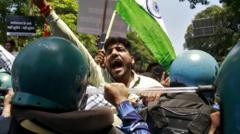On India’s side, Prime Minister Narendra Modi vowed to pursue the terrorists and their supporters relentlessly, calling the attack an assault on “the country’s soul.” Diplomatic retaliations have included the shutting down of the Attari-Wagah border and the cancellation of visas for Pakistani nationals. Pakistan has responded with reciprocal actions, including a suspension of trade and closure of airspace to Indian carriers.
The tragic events have led to increased security measures, with police detaining around 1,500 individuals in Kashmir for questioning. As the region grapples with the aftermath of these attacks, reports of harassment against Kashmiri students in other parts of India have surfaced, highlighting the communal tensions that often rise amid such incidents.
Reports indicate that the families of the deceased are mourning their loss, sparking widespread outrage over the violence. In a show of unity, an all-party meeting in Jammu and Kashmir condemned the violence. However, the ongoing retaliation between India and Pakistan raises concerns about potential military escalation, putting the fragile peace of the region at greater risk.
The situation remains tense, with both nations entrenched in their positions, leaving the prospects for dialogue and reconciliation elusive as communities on both sides feel the impacts of this deadly violence.
The tragic events have led to increased security measures, with police detaining around 1,500 individuals in Kashmir for questioning. As the region grapples with the aftermath of these attacks, reports of harassment against Kashmiri students in other parts of India have surfaced, highlighting the communal tensions that often rise amid such incidents.
Reports indicate that the families of the deceased are mourning their loss, sparking widespread outrage over the violence. In a show of unity, an all-party meeting in Jammu and Kashmir condemned the violence. However, the ongoing retaliation between India and Pakistan raises concerns about potential military escalation, putting the fragile peace of the region at greater risk.
The situation remains tense, with both nations entrenched in their positions, leaving the prospects for dialogue and reconciliation elusive as communities on both sides feel the impacts of this deadly violence.

















